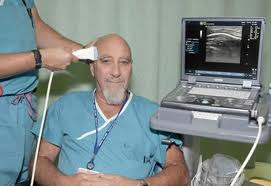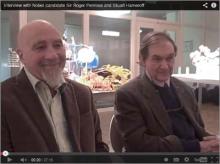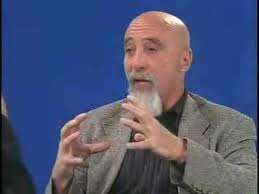Stuart R. Hameroff, MD
hameroff@u.arizona.edu
Director, Center for Consciousness Studies
Professor Emeritus, Departments of Anesthesiology, College of Medicine, University of Arizona and Psychology
Banner – University Medical Center Tucson
Aside from his full-time clinical role, Dr. Hameroff is involved in numerous research projects. Dr. Hameroff's research projects are potentially open to resident involvement time permitting.
Clinical Trial of Transcranial Ultrasound ('TUS')
see: anesth.medicine.arizona.edu/tus
see: anesth.medicine.arizona.edu/research/clinical-trials
Memory or Mood Problems?
Ongoing Clinical Trial of Transcranial Ultrasound ('TUS')
Investigator, Stuart Hameroff, MD
Publications, Journals, Interviews, Presentations - Highlights
2017
- Anesthetic Alterations of Collective Terahertz Oscillations in Tubulin Correlate with Clinical Potency: Implications for Anesthetic Action and Post-Operative Cognitive Dysfunction. Craddock TJA, Kurian P, Preto J, Sahu K, Hameroff SR, Klobukowski M, Tuszynski JA. Scientific Report, 2017 August.
2016
- Stuart R. Hameroff, Roger Penrose, Chapter 14 "Consciousness in the Universe: An Updated Review of the "Orch OR" Theory, in Biophysics of Consciousness: A Foundational Approach, eds. Roman R. Poznanski, Jack A. Tuszynski, Todd E. Feinberg, World Scientific, 2016
![]() 2016 Hameroff Penrose updated review of Orch OR chapter 14 Biophysics of Consciousness
2016 Hameroff Penrose updated review of Orch OR chapter 14 Biophysics of Consciousness
- Stuart Hameroff, Change the Music - Psychotherapy and Brain Vibrations, Vol 4 Issue 4, April 2016
2015
- 'Darwin Versus Deepak': Which Came First, Feelings, or the Brain? June 2, 2015
- The Guardian, Why Can't The World's Greatest Minds Solve the Mystery of Consciousness? Oliver Burkeman, Jan 21, 2015
- TThe Guardian's Audio Long Read 30:37
- Japan Wired Magazine - 2015 Death in A Quantum Space.pdf
- Current Topics in Medicinal Chemistry
- Travis JA Craddock, Stuart R Hameroff, Ahmed T Ayoub, Mariusz Klobukowski, Jack A Tuszynski, Anesthetics Act in Quantum Channels in Brain Microtubules to Prevent Consciousness, Current Topics in Medicinal Chemistry, 3/1/15, Vol 15:6, 523-533.
- Newswise - Anesthesia Points to Deeper Level ‘Quantum Channels’ March 23, 2015
2014
- Discovery of Quantum Vibrations in 'Microtubules' Inside Brain Neurons Supports Controversial Theory of Consciousness, Earth Changes Media, Sept 23, 2014
- Knock-out theory puts new spin on general anaesthesia, Chemistry World Review, Aug 12, 2014
- Ref: L Turin et al, Proc. Nat. Acad. Sci. USA., 2014, DOI: 10.1073/pnas.1404387111
- Response Hameroff to Turin et al.pdf - August 12, 2014
- Electron Theft, Not Drug Effects, May Be How Anesthesia Knocks People Out, Scientific American, Aug 13, 2014
- Discovery of Quantum Vibrations in 'Microtubules' Inside Brain Neurons Supports Controversial Theory of Consciousness, Science Daily, Jan 16, 2014
- Anesthesia's Electric Effects? World Science Festival, Aug 11, 2014
- Why Anesthesia Is One of the Greatest Medical Mysteries of Our Time, Daily Explainer/io9.com, June 19, 2014
- 'Collision Course' in the Science of Consciousness: Grand Theories to Clash at Tucson Conference, Huffington Post, Mar 18, 2014
- Toward a Science of Consciousness Conference, Tucson, April 2014 see: www.consciousness.arizona.edu
- Interview with Roger Penrose and Stuart Hameroff, Elsevier Connect, Amsterdam, Feb 20, 2014 Video 26:00- Sir Roger Penrose & Stuart Hameroff On How Quantum Vibrations in "Microtubules" Corroborates the Theory of Consciousness
- Consciousness in the universe - A review of the 'Orch OR' theory, SciDirect, Hameroff S, Penrose R (2014) Physics of Life Reviews 11:39-78
- 2014 Hameroff S, Penrose R Consciousness in the Universe: A Review of Orch OR Theory - Phys of Life Reviews.pdf
- Elsevier , Discovery of Quantum Vibrations in “Microtubules” Inside Brain Neurons Corroborates Controversial 20-Year-Old Theory of Consciousness, Jan 16, 2014, Amsterdam
-
- Controversial Theory of Consciousness Revisited: Discovery of Quantum Vibrations in 'Microtubules' Inside Brain Neurons, Science World Report, Jan 16, 2014
- Discovery of quantum vibrations in 'microtubules' corroborates theory of consciousness, PhysOrg Science News Wire - Jan 16, 2014
- Hameroff S, Penrose R, Consciousness in the Universe: A Review of Orch OR Theory - Phys of Life Reviews.pdf-2014
- Hameroff S, Penrose R - Reply to the seven commentaries on "Consciousness In the Universe: Review of the 'Orch OR' theory", Physics of Life Reviews, Vol 11, Issue 1, 94-100, March 2014.PDF
- Reply to Criticism of the 'Orch OR qubit' - Orchestrated objective reduction is scientifically jusfiied Hameroff S, Penrose R (2014) Physics of Life Reviews 11(1):104-112
Current Research Projects
Good Vibrations - Transcranial Ultrasound - Tuning the Brain
 Stuart Hameroff and colleagues performed the first clinical trial of trancranial ultrasound (TUS) on
Stuart Hameroff and colleagues performed the first clinical trial of trancranial ultrasound (TUS) on
mental states, finding improved mood after 15 seconds of sub-thermal 8 MHz ultrasound compared with placebo applied at the temporal skull. Another project is being planned numerous colleagues including, UA professor of psychology John Allen and postdoc Jay Sanguineti for mood, cognition and psychological and neurological disorders (including post-operative cognitive dysfunction) and others, tba.
Microtubules within brain neurons are thought to resonate at megahertz frequencies, precisely where ultrasound acts. We hope to enhance mood, and treat various neurological disorders by stimulating brain microtubule dynamics through TUS.
Transcranial ultrasound (TUS) effects on mental states: A pilot study, Brain Stimulation Hameroff S, Trakas M, Duffield C, Annabi E, Gerace MB, Boyle P, Lucas A, Amos Q, Buadu A, Badal JJ Received 21 November 2011; received in revised form 19 February 2012; accepted 6 May 2012. published online 30 May 2012. Brain Stimulation 6: 409-415 Abstract: http://dx.doi.org/10.1016/j.brs.2012.05.002
‘Good Vibrations’! Brain Ultrasound Improves Mood, (Newswise May 14, 2013) Non-invasive brain stimulation techniques aimed at mental and neurological conditions include transcranial magnetic stimulation (TMS) for depression, and transcranial direct current (electrical) stimulation (tDCS), shown to improve memory. Transcranial ultrasound stimulation (TUS) has also shown promise.UA professor of psychology John Allen and grad student Jay Sanguineti for mood, cognition and psychological and neurological disorders (including post-operative cognitive dysfunction). Microtubules within brain neurons are thought to resonate at megahertz frequencies, precisely where ultrasound acts.
Mediating Mood Through Brain Ultrasound (UA News, July 16, 2013
Stuart Hameroff and Sir Roger Penrose - Orch OR Theory
 Stuart Hameroff, MD is co-developer, with British physicist Sir Roger Penrose, of the controversial Penrose-Hameroff ‘Orch OR’ theory of consciousness, based on quantum computations in microtubules.
Stuart Hameroff, MD is co-developer, with British physicist Sir Roger Penrose, of the controversial Penrose-Hameroff ‘Orch OR’ theory of consciousness, based on quantum computations in microtubules.
2014- Selections - Orch OR
- Consciousness in the universe: a review of the 'Orch OR' theory. Hameroff S, Penrose R. Phys Life Rev. 2014 Mar;11(1):39-78. doi: 10.1016/j.plrev.2013.08.002. Epub 2013 Aug 20. PMID: 24070914
- Quantum walks in brain microtubules-a biomolecular basis for quantum cognition? Hameroff S., Top Cogn Sci. 2014 Jan;6(1):91-7. doi: 10.1111/tops.12068. Epub 2013 Nov 21. PMID: 24259348
- Quantum effects in the understanding of consciousness. Hameroff SR, Craddock TJ, Tuszynski JA. J Integr Neurosci. 2014 Apr;13(2):229-52. doi: 10.1142/S0219635214400093. PMID: 25012711
- Reply to Seven Commentaries on“Consciousness in the Universe: Review of the ‘Orch OR’ theory" Hameroff S, Penrose R (2014) Physics of Life Reviews 11:94–100
- Reply to Criticism of the 'Orch OR qubit' - Orchestrated objective reduction is scientifically jusfiied Hameroff S, Penrose R (2014) Physics of Life Reviews 11(1):104-112
2014 additional selections
- Knock-out theory puts new spin on general anaesthesia, Chemistry World, Aug 12, 2014
- World Science Festival Anesthesia's Electric Effects? | www.worldsciencefestival.com/.../anesthesi...
- Daily Explainer/io9.com 6/19/14
- Why Anesthesia Is One of the Greatest Medical Mysteries of Our Time
"Anesthetics are fairly selective, erasing consciousness while sparing non-conscious brain activity," Hameroff told io9.
"So the precise mechanism of anesthetic action should point to the mechanism for consciousness." more
Sir Roger Penrose and Stuart Hameroff discuss how the discovery of quantum vibrations in 'microtubules' corroborates the theory of consciousness - See www.Quantum.Consciousness.org
Center for Consciousness Studies (CCS) at the University of Arizona at the University of Arizona, established in 1997 by the Arizona Board of Regents. CCS is hosted by the Department of Anesthesiology at the University of Arizona College of Medicine. Dr. Hameroff is co-founder and director. contact: center@u.arizona.edu website: www.consciousness.arizona.edu
Toward a Science of Consciousness (TSC) Conference Series - is presented by the Center for Consciousness Studies (CCS) at the University of Arizona, and alternates yearly between Tucson, Ariz. (even-numbered years, from 1998 including 1999 Quantum Mind in Flagstaff and 2003 Quantum Mind in Tucson and various locations around the world (odd-numbered years) in cooperation with partner organizations and institutions. Overseas TSC Conferences have been held in: 1995 Ischia, Italy; 1997, Elsinore, Denmark; 1999, Tokyo, Japan; 2001, Skovde, Sweden; 2003, Prague, Czech Republic; 2005, Copenhagen, Denmark; 2007 Vienna, Austria; 2007, Budapest, Hungary; 2009, Hong Kong, China; 2011, Stockholm, Sweden; 2013, Agra, India; 2015, Helsinki, Finland; 2017, Shanghai, China
Research Interests
Consciousness studies, quantum mechanical/general relativity approaches to consciousness, protein conformational dynamics, molecular mechanisms of anesthetic gas molecules, information processing in cytoskeletal microtubules, quantum information science, essential features of living systems, nanotechnology, nanomedicine, philosophical pan-protopsychism, coherence and decoherence.
Research Website
UA Banner University Medical Center
Published Research
Summary Bio
Anesthesiologist, Professor and Researcher joined the faculty at University Medical Center in 1975. Dr. Stuart Hameroff's research for over 35 years has involved consciousness (how the pinkish gray meat between our ears produces the richness of experiential awareness). Studying anesthetic gas mechanisms, he focused on how quantum effects control protein conformational dynamics. Following an interest which began in medical school in the computational capacity of microtubules inside neurons, Dr. Hameroff proposed in the early 1980's that microtubules functioned as molecular computers. Hameroff’s 1987 book Ultimate Computing suggested downloading consciousness into microtubule arrays. In the mid-1990s Hameroff teamed with British physicist Sir Roger Penrose to develop the controversial theory of consciousness called “orchestrated objective reduction” - Orch OR theory - in which consciousness derives from quantum computations in microtubules inside brain neurons, quantum computations connected to the fine- scale structure of spacetime geometry. Dr. Hameroff has published five books and well over 100 research articles, and appeared in the film ‘What the Bleep do We Know?’ and numerous TV documentaries on the problem of consciousness including BBC, Discover Channel, History Channel, PBS, OWN, Huff Post Live and the film “What the Bleep?”
As Director of the Center for Consciousness Studies, established in 1997 at the University of Arizona, Hameroff co-organizes (with philosopher David Chalmers) the international, interdisciplinary biennial conference series ‘Toward a Science of Consciousness’ since 1994. For the past 20 + years TSC, CCS has been providing opportunities for researchers to meet in an international and interdisciplinary setting and has provided scholarships, grants, webcourses, seminars, symposiums. The Center is grateful for the past research support from Pfizer-Roerig, NSF, Fetzer Institute The Chopra Foundation, The Bhaumik Foundation, YeTaDeL Foundation, Google, Elata Foundation, Journal of Consciousness Studies, Journal of Cosmology, Monroe Institute, NIMS, and Mind Event AB, AOARD, EOARD, AFOSR.
Dr. Hameroff is grateful to his current and past fellow faculty and residents in the Department of Anesthesiology, surgeons and nurses and techs in the operating rooms, artist Dave Cantrell, webmeisters Ed Xia, Abi Behar Montefiore, Rita Ellsworth, graphic designers Roma Krebs, Darla Keneston; technical support of Scott Morgan, Michael Griffith, Ricky Bergeron and Erica Coleman; TSC conference manager and CCS assistant director, Abi Behar-Montefiore and Toward a Science co-director Philosopher David Chalmers as well as his numerous scientific collaborators including: Sir Roger Penrose, Jack Tuszynski, Anirban Bandyopadhyay, Travis Craddock, John JB Allen, Jay Sanguinetti, and Sterling Cooley.
2014-Presentations
- Plenary 9, TSC, Stuart Hameroff, Quantum Vibrations in Microtubules - Orch OR - 20 Years On
- Microtubules and Quantum Biology-Pre Conference Workshop, April 21, 2014, Roger Penrose, Jack Tuszynski, Travis Craddock, Anirban Banyopadhyay, Stuart Hameroff quantum vibrations in microtubules support the controversial Orch OR theory, and provide a basis for EEG as ‘beat frequencies’ of intra-neuronal dynamics.
- Grand Theories to Clash at Tucson Conference - Collision Course, in the Science of Consciousness
-
10th Symposium of the Bial Foundation 26th to 29th March 2014, Lisbon, Portugal, Casa do Médico - Porto, Behind and Beyond the Brain; Mind-Matter Interactions, Hameroff, Stuart, Keynote, ‘Consciousness, microtubules and quantum nonlocality - The 'Orch OR' theory’
-
The Brainstorm Sessions, ABC Night of the Brain,The Flemish Arts Centre De Brakke Grond and UvA, January 2014, Amsterdam, The Netherlands, Hameroff, SR., ‘Orch OR theory - Microtubules and the great debate about consciousness’
- RealityShifters Blog, Interview with author Cynthia Sue Larson
- AZ Daily Star UAST-Allen- Good Vibrations Improve Mood, 2014-Nov 30.pdf
2013
- Transcranial ultrasound (‘TUS’) – an optimal non-invasive brain-machine interface via microtubules? Society for Neuroscience, November 14, 2013 SR Hameroff, JL Sanguinetti, C Duffield, U Raman, S Ghosh,S Parker, QD Amos, JJB Allen Abstract
- Good Vibrations: Mediating Mood Through Brain Ultrasound
- Non-invasive brain stimulation techniques aimed at mental and neurological conditions include transcranial magnetic stimulation (TMS) for depression, and transcranial direct current (electrical) May 15, 2013, Science Daily... full story
- July 18, 2013 — Researchers have developed a novel technique to affect mood through ultrasound vibrations applied to the brain. Their findings could potentially lead to new treatments for psychological and ... full story
- Huffington Post, Letter to the TED-itors, Apr 18, 2013
- MP3s in your genes? Is Human DNA the same as computer code? HPL 2/6/13, Panel hosted by Josh Zepps, Video
- Can Images Unlock the Mystery of a Healing Brain? MedPage Today, Nancy Walsh, 2/1/13
- Probing The Unknowable Mysteries of the Brain, Marcelo Gleiser, NPR, December 4, 2013 reporting from the Agra TSC Conference.
13.7 cosmos & culture commentary on science and society
2012
- How quantum brain biology can rescue conscious free will, Frontiers in Integrative Neuroscience, Hameroff S, Oct 12, 2012
- Hameroff, S., Comment on: Comment on “Consciousness, biology and quantum hypotheses” in Quantum brain biology complements neuronal assembly approaches to consciousness by Baars and Edelman, S. Hameroff, 2012; July 11
- Post Anesthesia Dementia, like Alzheimer's, Looks Micro-'Tubular', Science Daily, June 27, 2012
- Craddock TJA, St. George M, Freedman H, Barakat KH, Damaraju S, et al. Computational Predictions of Volatile Anesthetic Interactions with the Microtubule Cytoskeleton: Implications for Side Effects of General Anesthesia. PLoS ONE, 2012 DOI: 10.1371/journal.pone.0037251
- Good Vibrations:' Brain Ultrasound Improves Mood
- Zinc, microtubules and Alzheimer's disease, in PLoS One
- Anesthetics, tubulin and post-operative cognitive dysfunction, in PLoS One
Despite a century of research, memory encoding in the brain has remained mysterious. Neuronal synaptic connection strengths are involved, but synaptic components are short-lived while memories last ... full story
- Travis J. A. Craddock, Jack A. Tuszynski, Stuart Hameroff. Cytoskeletal Signaling: Is Memory Encoded in Microtubule Lattices by CaMKII Phosphorylation? PLoS Computational Biology, 2012; 8 (3): e1002421 DOI: 10.1371/journal.pcbi.1002421 -
2011
- Additional Photos
 2016 Hameroff Penrose updated review of Orch OR chapter 14 Biophysics of Consciousness
2016 Hameroff Penrose updated review of Orch OR chapter 14 Biophysics of Consciousness
Contact
Stuart Hameroff MD,
Department of Anesthesiology, University of Arizona
Director, Center for Consciousness Studies
hameroff@email.arizona.edu
U.S. Mail
University of Arizona, Department of Anesthesiology, Center for Consciousness Studies
P.O Box 245114 - 1501 N Campbell Ave. 5th floor Su. 5301
Tucson, Arizona USA 85724-5114
Additional Links
- LINK TO PUB MED.gov
- Dept of Anesthesiology/Research/Consciousness Research/University of Arizona
- Dept of Anesthesiology/Faculty Page/ University of Arizona
- Hameroff Research Website www.QuantumConsciousness.org - www.quantum-mind.org - www.hameroff.com
- Wikipedia/S.R. Hameroff and Orch OR - Orchestrated objective reduction theory
- Center for Consciousness Studies / Toward a Science of Consciousness Conferences


